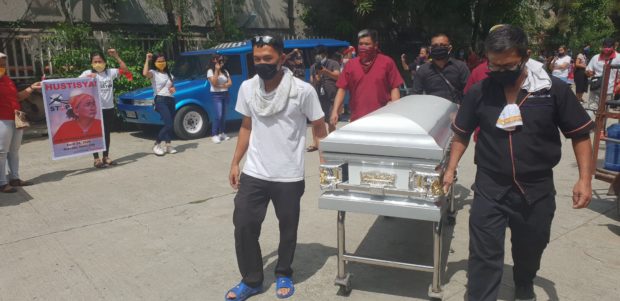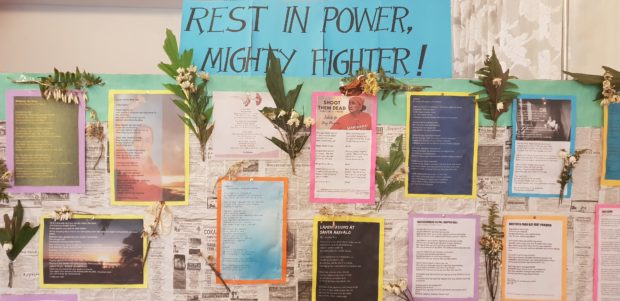Slain activist Jory Porquia laid to rest as kin, colleagues cry for justice

Family members, friends and colleagues of slain Iloilo activist Jose Reynaldo “Jory” Porquia pay tribute before his remains were cremated on Saturday (Photo by Nestor P. Burgos Jr./INQUIRER VISAYAS)
ILOILO CITY—Slain activist Jose Reynaldo “Jory” Porquia was cremated on May 17, more than two weeks after he was gunned down inside a rented house here.
Wearing masks and at least a meter apart, family members and fellow activists raised clenched fists as the coffin containing his remains was brought to a crematorium here.
“Justice for Jory Porquia!”they shouted minutes after a eulogy where family members, friends, and fellow activists offered prayers, songs, poems, and tributes.
“Toto, you died a brutal death. You are a hero in the eyes of many. They will never forget you. I find comfort in thinking that many loved you,” Porquia’s younger sister Liza, who is based in Singapore, said in a video message at the eulogy.
Their 85-year-old mother Lolita and sister Nova also sent a video message from Canada.
“I want to see you but I am here. I am trying to stop from crying. I wanted to go home but it is impossible. I will be there in due time,” said their mother.

Poems honoring slain Iloilo activist Jose Reynaldo “Jory” Porquia were displayed at his wake at a funeral parlor and crematorium in Iloilo City (Photo by Nestor P. Burgos Jr./INQUIRER VISAYAS)
Porquia, 58, the eldest of five siblings, was gunned down by masked armed men on April 30 at a rented cottage where he had intended to put up a coffee shop and eatery in Barangay Sto. Niño Norte in Arevalo District, Iloilo City.
He died from nine gunshot wounds including one at the back of his head.
Porquia, a popular activist during the Marcos dictatorship, was the Iloilo City coordinator of the partylist group Bayan Muna. At the time of his death, he was actively leading their organization’s feeding program for communities most affected by the COVID-19 quarantine measures.
A son of a policeman who became the first chairperson of the militant League of Filipino Students in Panay in 1984, Porquia was repeatedly arrested for leading protests against the dictatorship.
After spending years as a migrant worker in China, Saudi Arabia, and Singapore, he also became regional coordinator in Panay of the migrant group Migrante.
His family and colleagues remembered him as jovial and wacky even as he was passionate in his beliefs and works.
“Jory was well-grounded in his beliefs. He went to Saudi and China but he was still (an activist) when he came back,” a friend and fellow activist in the 1980s said.
Investigators have not yet identified or arrested suspects more than two weeks after his killing.
Capt. Shella Mae Sangrines, spokesperson of the Iloilo City Police Office, said an investigation is still being conducted by the Arevalo District police station.
“So far, there has been no development but the investigation is being actively pursued,” she told the INQUIRER.
Colleagues of Porquia pointed out that policemen had questioned and attempted to stop the feeding program led by Porquia.
Policemen said that they were checking if the activities were being coordinated with village officials.
Porquia’s Manila-based son, Lean, who was not also able to come home, said they will not stop seeking justice for his father.
“At this point, we cannot trust the police to conduct an impartial and credible investigation,” he said.
Lawyer Jhonnie Dabuco, director of the Commission on Human Rights in Western Visayas, said they were conducting an investigation but were hampered by limited movement due to community quarantine measures.
“We are all adopting to a ‘new normal’ because of the pandemic but we must not allow the killing of activists and those critical of the government to be part of this ‘new normal’,” Siegfred Deduro, Bayan Muna vice president for Visayas, said during the eulogy.